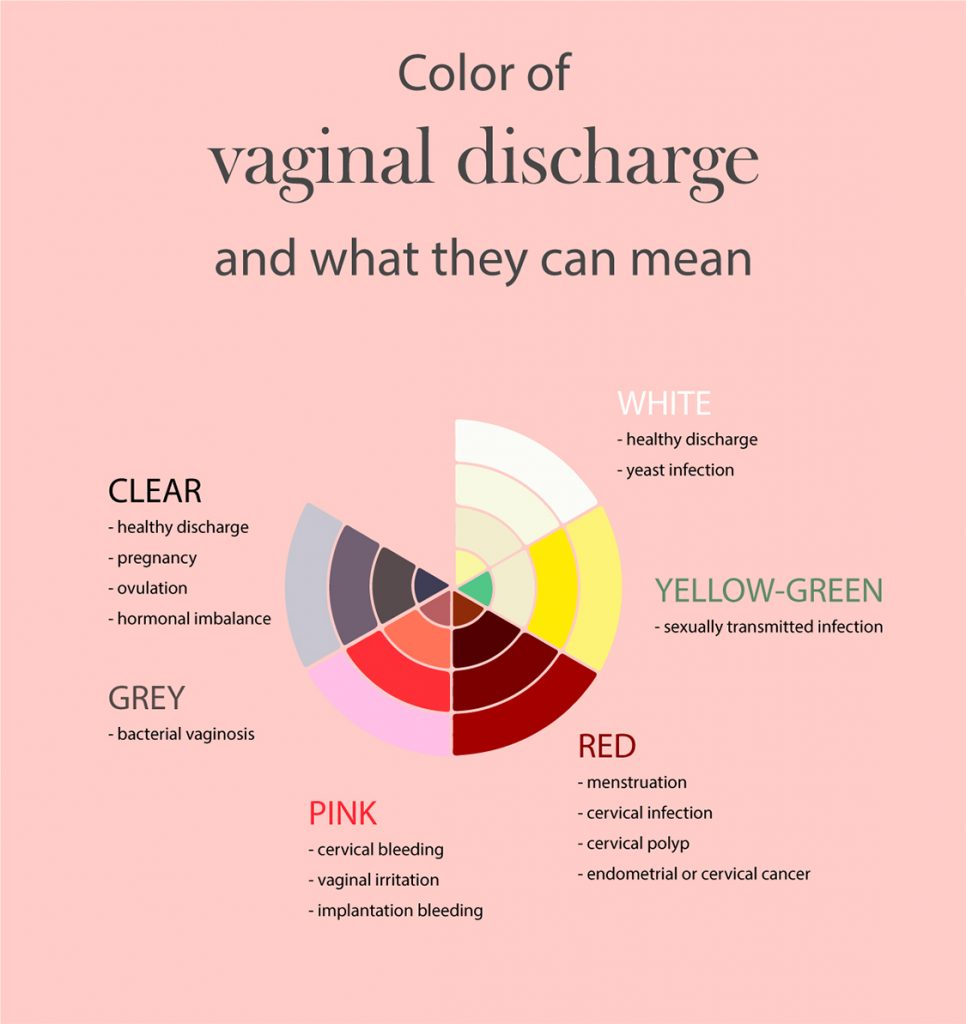
Table of Contents
Overview
You may have noticed a milky-whitish fluid released by your vagina. The fluid is termed as vaginal discharge. The amount, color, and odor of vaginal discharge may vary from woman to woman.
While vaginal discharge, which is made of vaginal skin cells or bacteria, is a healthy way for your vagina to protect itself from infections and for lubrication, at times it can deem to be bothersome as well.
Healthy vs. Unhealthy Vaginal Discharge
Vaginal discharge is a natural phenomenon of the vagina. But, sometimes it can signal a problem. Normal vaginal discharge helps keep the vagina clean. The discharge often appears milky and dries on the panties.
But, if the amount of the vaginal discharge suddenly increases in amount, appears greenish or brownish in color, and has a foul smell, it could be an unhealthy vaginal discharge.

Signs of a healthy vaginal discharge::
- Clear or milky-white in color
- Subtle odor
- Varying amount throughout the menstrual cycle
One can always use a pantiliner to keep the underwear dry, but should also make sure to not use it every day.
Signs of an unhealthy vaginal discharge::
- Change in the odor- where the smell becomes foul
- Change in color- greenish-yellow
- Change in texture- lumpy, thick, or foamy
- Burning sensation or soreness of the vulvar skin
- Itchiness of the vaginal opening
- Pain during intercourse or even while urinating
- Abdominal pain
One should seek help from a gynecologist as soon as one experiences these symptoms.

Can vaginal infection cause vaginal discharge?
Yes, there are different types of vaginal infections which can cause unhealthy discharge from the vagina. The common infections that may cause vaginal discharge are:
–Bacterial Vaginosis: It is a bacterial infection that can happen at any age, but mostly affects women in their reproductive years. It is a type of vaginal inflammation that increases vaginal discharge due to the overgrowth of the bacteria in the vagina.
The discharge is foul-smelling, thin, grey/white/green in colour. Some women may not experience any symptoms of bacterial vaginosis.
–Rectovaginal Fistula: It is an abnormal connection between the lower portion of your large intestine — your rectum — and your vagina. They may be the result of an injury, an infection, surgery, etc. One may experience foul-smelling vaginal discharge as one of the symptoms. Pristyn Care treats Fistula using the latest non-invasive laser treatment.
–Gonorrhea and Chlamydia: They are sexually transmitted diseases that can produce abnormal, yellowish-green vaginal discharge. One should contact a doctor immediately.
– Cervical Cancer: Cervical Cancer does not always produce symptoms, but it may result in continuous vaginal discharge that may appear pale, watery, pink, brown, bloody, or foul-smelling.
To stay safe, it is always better to get a pap smear test.

Other Causes of Vaginal Discharge
Apart from the above-mentioned causes, a woman might experience vaginal discharge due to other natural phenomena that happen within her body, such as:
- Pregnancy: During pregnancy, a woman may experience sticky, pale white/yellow secretion from their vagina. This is a result of increased hormones. The fluids prevent infections as the cervix and vaginal walls soften during pregnancy.
- Menopause: A woman experiences many changes in her bodily functions during menopause. One of them consists of the amount of vaginal discharge. The fluid may increase or decrease during this period due to the increase in hormone levels.
- Postmenopause may result in abnormal discharge due to a decrease in estrogen levels. The decrease causes thinning of the vagina and makes it dry, as a result of which the secretion of fluid may increase.
- A tampon lodged between the cervix and vagina for too long can be the cause of the vaginal discharge.
- Exercise, use of birth control pills, and emotional stress may also result in vaginal discharge.
- Douches, scented soaps/creams
- Diabetes

When to see a gynecologist for vaginal discharge?
It is best to visit a gynecologist when you notice a change in the colour, texture and odour of your vaginal discharge along with which you experience fatigue, frequent urination, fever, stomach/back pain, etc. (Also read: Vaginal Discharge & Its Types)

Home care to prevent vaginal infections
Vaginal discharge is not a life-threatening phenomenon. Vaginal discharge is absolutely normal, so there’s no way a woman can prevent it. But, there are ways a woman can prevent vaginal infections, and in turn, the occurrence of unhealthy vaginal discharge.
- While engaging in sexual activity, one should make sure to use condoms.
- After a shower, keep your vaginal area dry.
- Abstain from douching
- Avoid wearing tight jeans or underwear.
- Wipe from front to rear after using the toilet.
- Follow proper hygiene
- Use cold compression to relieve the itching, swelling, or discomfort of the vulva.
- Rinse genitals with water and pat dry after using the toilet
- Avoid the use of baby wipes or scented toilet paper
- Wear cotton underwear
- Urinate after intercourse to prevent a UTI
How is vaginal discharge treated?
In many cases, it is possible to make a diagnosis and begin treatment after asking the patient several questions about their health history and performing a physical examination. In other cases, a few required tests will need to be performed. Once the cause is determined, the patient will be given treatment options.
If you do have a vaginal infection:
-Take the medicine as prescribed
-Use the prescribed vaginal cream and do not use tampons while using it
-Do not have intercourse during your treatment
-If the doctor mentions that the infection can spread through intercourse, inform your partner immediately.
Takeaway
Although many women try to avoid seeking help from their health practitioner, self-treatment can delay the correct diagnosis or even worsen the symptoms.
If you notice a distinct change in your vaginal discharge, it is always best to take it up to a health care provider.
If you think that all is not well with your vagina, you can consult with an expert gynecologist at Pristyn Care and discuss the causes that are bothering you.







